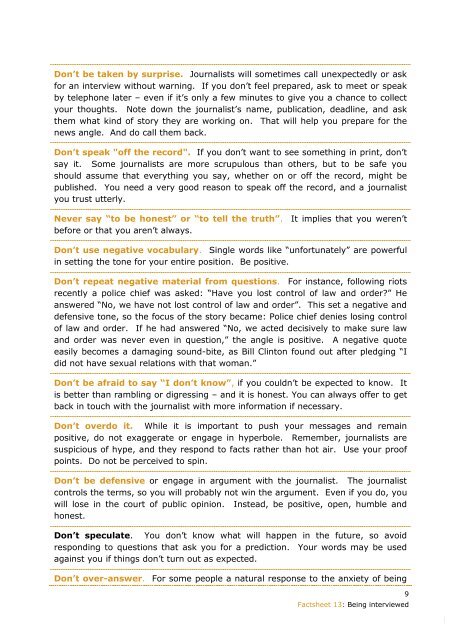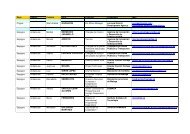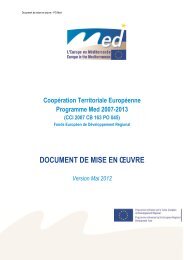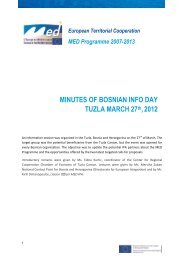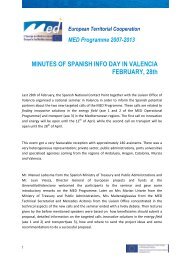MED Communication Handbook - Programme Med
MED Communication Handbook - Programme Med
MED Communication Handbook - Programme Med
Create successful ePaper yourself
Turn your PDF publications into a flip-book with our unique Google optimized e-Paper software.
Don’t be taken by surprise. Journalists will sometimes call unexpectedly or ask<br />
for an interview without warning. If you don’t feel prepared, ask to meet or speak<br />
by telephone later – even if it’s only a few minutes to give you a chance to collect<br />
your thoughts. Note down the journalist’s name, publication, deadline, and ask<br />
them what kind of story they are working on. That will help you prepare for the<br />
news angle. And do call them back.<br />
Don’t speak "off the record". If you don’t want to see something in print, don’t<br />
say it. Some journalists are more scrupulous than others, but to be safe you<br />
should assume that everything you say, whether on or off the record, might be<br />
published. You need a very good reason to speak off the record, and a journalist<br />
you trust utterly.<br />
Never say “to be honest” or “to tell the truth”. It implies that you weren’t<br />
before or that you aren’t always.<br />
Don’t use negative vocabulary. Single words like “unfortunately” are powerful<br />
in setting the tone for your entire position. Be positive.<br />
Don’t repeat negative material from questions. For instance, following riots<br />
recently a police chief was asked: “Have you lost control of law and order?” He<br />
answered “No, we have not lost control of law and order”. This set a negative and<br />
defensive tone, so the focus of the story became: Police chief denies losing control<br />
of law and order. If he had answered “No, we acted decisively to make sure law<br />
and order was never even in question,” the angle is positive. A negative quote<br />
easily becomes a damaging sound-bite, as Bill Clinton found out after pledging “I<br />
did not have sexual relations with that woman.”<br />
Don’t be afraid to say “I don’t know”, if you couldn’t be expected to know. It<br />
is better than rambling or digressing – and it is honest. You can always offer to get<br />
back in touch with the journalist with more information if necessary.<br />
Don’t overdo it. While it is important to push your messages and remain<br />
positive, do not exaggerate or engage in hyperbole. Remember, journalists are<br />
suspicious of hype, and they respond to facts rather than hot air. Use your proof<br />
points. Do not be perceived to spin.<br />
Don’t be defensive or engage in argument with the journalist. The journalist<br />
controls the terms, so you will probably not win the argument. Even if you do, you<br />
will lose in the court of public opinion. Instead, be positive, open, humble and<br />
honest.<br />
Don’t speculate. You don’t know what will happen in the future, so avoid<br />
responding to questions that ask you for a prediction. Your words may be used<br />
against you if things don’t turn out as expected.<br />
Don’t over-answer. For some people a natural response to the anxiety of being<br />
9<br />
Factsheet 13: Being interviewed<br />
�


